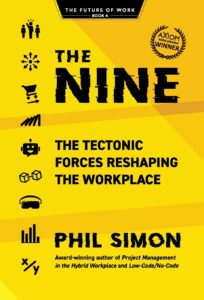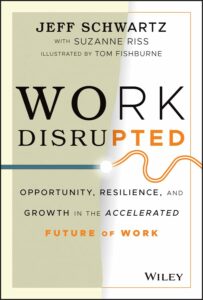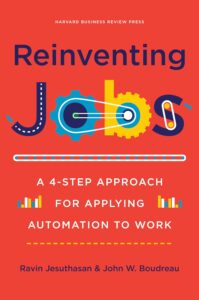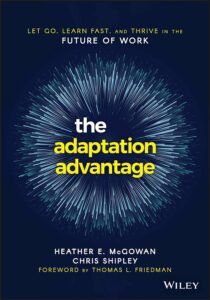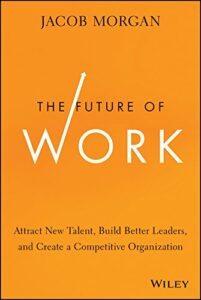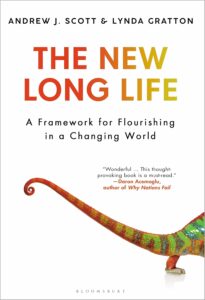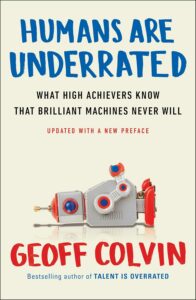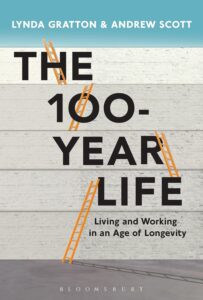Books about shaping the future of work
The future of work encompasses emerging trends in automation, remote work, gig economy, workforce diversity, and new skills required for success. To help our readers navigate these changes and lead effectively in their organizations, here’s a curated list of some of the most popular and highly-rated books on the future of work. These books provide valuable insights, research, and practical advice for adapting to and thriving in the workplace of tomorrow.
1. “The Nine: The Tectonic Forces Reshaping the Workplace” by Phil Simon
Phil Simon’s “The Nine” explores the nine key forces that are transforming the workplace, from remote work and the gig economy to artificial intelligence and new leadership models. Simon provides a detailed analysis of these forces and offers practical advice on how organizations can adapt to these changes to stay competitive. The book is an excellent resource for leaders looking to understand and navigate the complexities of the modern workplace.
Amazon Description:
In many ways, the workplace of 2023 already differs from its pre-pandemic counterpart. In some cases, it’s downright unrecognizable. What’s more, this gap will only intensify in the coming years. Blame—or thank, if you like—powerful economic, societal, geopolitical, and technological forces. They include generative AI, automation, dispersed workforces, blockchain, immersive technologies, employee empowerment, and the return of systemic inflation.
Brass tacks: The workplace is undergoing a massive, irrevocable shift. The only question for business leaders is, What should you do about it?
In The Nine: The Tectonic Forces Reshaping the Workplace, award-winning author and world-renowned workplace tech expert Phil Simon answers that question in spades. He peers into the dizzying and chaotic future of work. Simon slices through the hype surrounding nascent trends and newfangled technologies.
2. “Work Disrupted: Opportunity, Resilience, and Growth in the Accelerated Future of Work” by Jeff Schwartz
Jeff Schwartz’s “Work Disrupted” focuses on the rapid pace of change in the workplace and how individuals and organizations can prepare for it. Drawing on his experience as a consultant at Deloitte, Schwartz provides a framework for understanding the forces shaping the future of work, including automation, digital transformation, and evolving workforce demographics. The book offers actionable strategies for building resilience and seizing opportunities in a disrupted world.
Amazon Description:
The future of work swept in sooner than expected, accelerated by Covid-19, creating an urgent need for new maps, new mindsets, new strategies– and most importantly, a trusted guide to take us on this journey. That guide is Jeff Schwartz. A founding partner of Deloitte Consulting’s Future of Work practice, Schwartz brings clarity, humor, wisdom, and practical advice to the future of work, a topic surrounded by misinformation, fear, and confusion. With a fundamental belief in the power of human innovation and creativity, Schwartz presents the key issues, critical choices, and potential pitfalls that must be on everyone’s radar.
3. “Reinventing Jobs: A 4-Step Approach for Applying Automation to Work” by Ravin Jesuthasan and John W. Boudreau
“Reinventing Jobs” provides a practical guide for leaders on how to navigate the impact of automation on work. Ravin Jesuthasan and John W. Boudreau offer a structured approach to redesigning jobs and workflows, helping organizations harness automation while optimizing human roles. The book is particularly useful for leaders looking to strategically integrate technology into their workforce planning.
Amazon Description:
Your organization has made the decision to adopt automation and artificial intelligence technologies. Now, you face difficult and stubborn questions about how to implement that decision: How, when, and where should we apply automation in our organization? Is it a stark choice between humans versus machines? How do we stay on top of these technological trends as work and automation continue to evolve?
Work and human capital experts Ravin Jesuthasan and John Boudreau present leaders with a new set of tools to answer these daunting questions. Transcending the endless debate about humans being replaced by machines, Jesuthasan and Boudreau show how smart leaders instead are optimizing human-automation combinations that are not only more efficient but also generate higher returns on improved performance.
4. “The Adaptation Advantage: Let Go, Learn Fast, and Thrive in the Future of Work” by Heather E. McGowan and Chris Shipley
Heather E. McGowan and Chris Shipley’s “The Adaptation Advantage” focuses on the importance of adaptability and continuous learning in the future workplace. The authors argue that in a rapidly changing world, the ability to let go of outdated skills and learn new ones quickly is a critical competitive advantage. They provide practical guidance on how individuals and organizations can develop an adaptive mindset.
Amazon Description:
Technology is changing work as we know it. Cultural norms are undergoing tectonic shifts. A global pandemic proves that we are inextricably connected whether we choose to be or not. So much change, so quickly, is disorienting. It’s undermining our sense of identity and challenging our ability to adapt. But where so many see these changes as threatening, Heather McGowan and Chris Shipley see the opportunity to open the flood gates of human potential―if we can change the way we think about work and leadership. They have dedicated the last 5 years to understanding how technical, business, and cultural shifts affecting the workplace have brought us to this crossroads, The result is a powerful and practical guide to the future of work for leaders and employees. The future can be better, but only if we let go of our attachment to our traditional (and disappearing) ideas about careers, and what a “good job” looks like.
Blending wisdom from interviews with hundreds of executives, The Adaptation Advantage explains the profound changes happening in the world of work and posits the solution: new ways to think about careers that detach our sense of pride and personal identity from our job title, and connect it to our sense of purpose. Activating purpose, the authors suggest, will inherently motivate learning, engagement, empowerment, and lead to new forms of pride and identity throughout the workforce. Only when we let go of our rigid career identities can we embrace and appreciate the joys of learning and adapting to new realities―and help our organizations do the same.
5. “The Future of Work: Attract New Talent, Build Better Leaders, and Create a Competitive Organization” by Jacob Morgan
Jacob Morgan’s book offers a comprehensive look at the future of work from multiple angles, including leadership, employee experience, and organizational culture. “The Future of Work” is based on Morgan’s research and interviews with leaders from around the world, providing practical strategies for creating a future-ready organization. He emphasizes the importance of trust, empowerment, and flexibility in fostering a productive and innovative workplace.
Amazon Description:
Throughout the history of business employees had to adapt to managers and managers had to adapt to organizations. In the future this is reversed with managers and organizations adapting to employees. This means that in order to succeed and thrive organizations must rethink and challenge everything they know about work.
The demographics of employees are changing and so are employee expectations, values, attitudes, and styles of working. Conventional management models must be replaced with leadership approaches adapted to the future employee. Organizations must also rethink their traditional structure, how they empower employees, and what they need to do to remain competitive in a rapidly changing world.
6. “The New Long Life: A Framework for Flourishing in a Changing World” by Lynda Gratton and Andrew J. Scott
Lynda Gratton and Andrew J. Scott explore how increasing longevity and technological advancements are reshaping our work lives. “The New Long Life” provides a roadmap for navigating the challenges and opportunities of longer careers, emphasizing the need for continuous learning and adaptability. The authors offer insights into how individuals and organizations can thrive in a world where traditional career paths are evolving.
Amazon Description:
Smart new technologies. Longer, healthier lives. Human progress has risen to great heights, but at the same time it has prompted anxiety about where we’re heading. Are our jobs under threat? If we live to 100, will we ever really stop working? And how will this change the way we love, manage and learn from others?
One thing is clear: advances in technology have not been matched by the necessary innovation to our social structures. In our era of unprecedented change, we haven’t yet discovered new ways of living.
Drawing from the fields of economics and psychology, Andrew J. Scott and Lynda Gratton offer a simple framework based on three fundamental principles (Narrate, Explore and Relate) to give you the tools to navigate the challenges ahead. Both a personal road-map and a primer for governments, corporations and colleges, The New Long Life is the essential guide to a longer, smarter, happier life.
7. “Humans Are Underrated: What High Achievers Know That Brilliant Machines Never Will” by Geoff Colvin
In “Humans Are Underrated,” Geoff Colvin argues that as technology continues to advance, uniquely human skills such as empathy, creativity, and collaboration will become increasingly valuable. The book explores how individuals and organizations can cultivate these skills to stay competitive in an AI-driven world. Colvin provides compelling evidence and real-world examples to support the case for focusing on human-centric skills.
Amazon Description:
It’s easy to imagine a nightmare scenario in which computers simply take over most of the tasks that people now get paid to do. While we’ll still need high-level decision makers and computer developers, those tasks won’t keep most working-age people employed or allow their living standard to rise. The unavoidable question—will millions of people lose out, unable to best the machine?—is increasingly dominating business, education, economics, and policy.
The bestselling author of Talent Is Overrated explains how the skills the economy values are changing in historic ways. The abilities that will prove most essential to our success are no longer the technical, classroom-taught left-brain skills that economic advances have demanded from workers in the past. Instead, our greatest advantage lies in what we humans are most powerfully driven to do for and with one another, arising from our deepest, most essentially human abilities—empathy, creativity, social sensitivity, storytelling, humor, building relationships, and expressing ourselves with greater power than logic can ever achieve. This is how we create durable value that is not easily replicated by technology—because we’re hardwired to want it from humans.
8. “The 100-Year Life: Living and Working in an Age of Longevity” by Lynda Gratton and Andrew J. Scott
“The 100-Year Life” examines how increased life expectancy is reshaping careers, finances, and personal lives. Lynda Gratton and Andrew J. Scott discuss the implications of living longer, including the need for more flexible and varied career paths. The book provides insights into how individuals can plan for a 100-year life, balancing work, education, and leisure over a longer period.
Amazon Description:
Does the thought of working for 60 or 70 years fill you with dread? Or can you see the potential for a more stimulating future as a result of having so much extra time?
Many of us have been raised on the traditional notion of a three-stage approach to our working lives: education, followed by work and then retirement. But this well-established pathway is already beginning to collapse – life expectancy is rising, final-salary pensions are vanishing, and increasing numbers of people are juggling multiple careers. Whether you are 18, 45 or 60, you will need to do things very differently from previous generations and learn to structure your life in completely new ways.
The 100-Year Life is here to help.
Future of Work Books List Conclusion
These books offer a wealth of knowledge and practical advice for understanding and preparing for the future of work. Whether you are a leader looking to guide your organization through change or an individual seeking to develop new skills, these resources provide valuable insights into the trends and challenges shaping the workplace of tomorrow. For more information on the future of work and emerging skills, be sure to explore this article on Design Thinking for the Future of Work.

